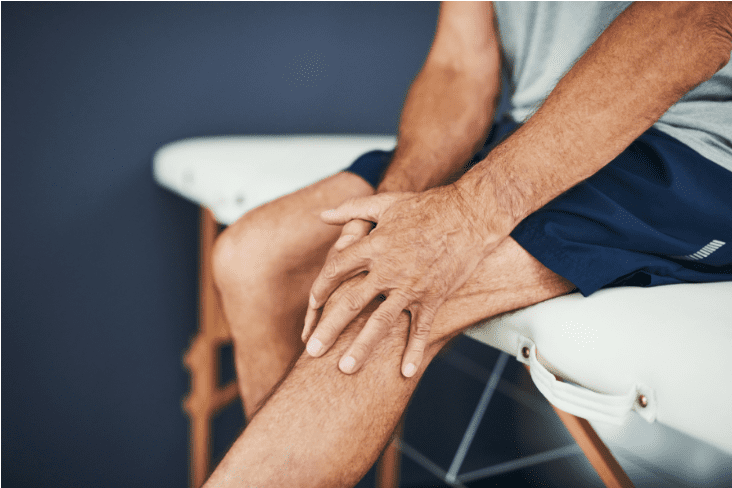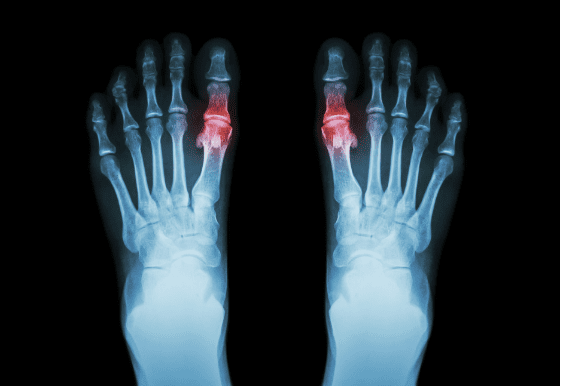Column One
Column Two
Column Three

Jump to section
Arthritis can have a significant impact on your ability to stay comfortable and pain-free on your feet, and to move with confidence. It affects your joints, and does so in a range of ways depending on the type of arthritis you have. While there are over 140 different types of arthritis, the most common types seen by our podiatrists across our Brisbane City and Newmarket clinics include osteoarthritis, rheumatoid arthritis, gout, and juvenile idiopathic arthritis in children.
 Osteoarthritis
Osteoarthritis
Osteoarthritis is commonly referred to as wear-and-tear arthritis as it occurs when the cartilage (smooth elastic tissue) that protects the ends of the bones breaks down over time. This results in pain and swelling at your major joints, often making them hard to move. Osteoarthritis is the most common type of arthritis and can affect any joint, though it mostly affects the weight-bearing joints in your hands, knees, hips and feet. It can develop at any age, but you'll mostly see it in people over 40. Osteoarthritis is more common in women than men and more common in those that have had joint injuries in the past.
Osteoarthritis symptoms can vary from person to person and will depend on which joints are affected. Symptoms often start with a mild presentation and gradually worsen over time (months or years) as the joint continues to deteriorate. Common symptoms may include:
While osteoarthritis can’t be cured, there is a lot that we can do to help reduce your pain and improve your comfort on your feet. For many people, this helps restore their mobility and confidence on their feet, significantly improving their quality of life. Our osteoarthritis treatment plan may involve:
Rheumatoid arthritis is an autoimmune disorder that affects your body through persistent damage to the lining of the joints. It occurs when the immune system doesn't work properly, mistakenly attacking your own healthy cells. This causes pain and inflammation.
One of the distinguishing factors of the disease is that it typically affects the joints symmetrically, across multiple joints. The joints commonly involved include: the small joints of your hands and feet, knees, hips, ankles, elbows and shoulders. In some people, the disease will affect more than just your joints, and may cause damage to your skin, eyes, lungs, heart and blood vessels.
Rheumatoid arthritis tends to present in symptomatic ‘flares’, as opposed to the symptoms being constant over months or years. The most common symptoms of rheumatoid arthritis that we see during a flare include having painful and inflamed joints, stiffness or restricted movement at the joints, rheumatoid ‘nodules’, and changes to the shape of the joints over time. Joint inflammation is typically symmetrical, with multiple joints affected at the same time. Muscle and joint pain can also present with fatigue, fever and a loss of appetite.
Treating rheumatoid arthritis typically includes medication prescribed by your GP to help manage the flares and help prevent them from occurring in the first place. As part of your podiatry care with us, we may help by:
By keeping you moving comfortably, we hope to keep you independent, doing the things you love, and taking advantage of every opportunity.
 Gout
is an inflammatory arthritis that results from a high concentration of uric acid concentrating in the blood. This uric acid crystallises
in the joints to form sharp, needle-like spicules that are very painful. This is known as a gout ‘flare’. A uric acid build-up
is associated with a high intake of purine-containing foods like red meats and shellfish. We most often see and treat gout in middle-aged
men.
Gout
is an inflammatory arthritis that results from a high concentration of uric acid concentrating in the blood. This uric acid crystallises
in the joints to form sharp, needle-like spicules that are very painful. This is known as a gout ‘flare’. A uric acid build-up
is associated with a high intake of purine-containing foods like red meats and shellfish. We most often see and treat gout in middle-aged
men.
Gout feels like sharp, painful crystals in the joints. Often, this is in the big toe or the joints of the feet. The pain tends to come on sharply, and the joint will likely feel warm, red or swollen. Your joint may feel painful from even the lightest touch, and flares tend to last from days to weeks, though they’ve been reported to last much longer.
The key to treating gout is reducing your intake of purine-rich foods. We also recommend wearing socks and keeping your feet warm as much as possible to help demote the crystal formation. Exercise between flares can also help manage other factors that may contribute to gout including obesity, stress and diabetes.
Our podiatry team can support you in helping offload painful joints with custom foot orthotics, and ensuring your footwear is optimising your comfort and mobility, and not hindering it. We’ll also assess the integrity of the affected joints when you don’t have a flare and make a plan to help slow any further joint deterioration.
We also find great success using the MLS laser for pain relief. It is a safe, effective and painless way to reduce pain and inflammation, and improve the comfort and quality of life of those living with osteoarthritis. You can read more about how the laser can help you here.
Juvenile idiopathic arthritis is the name given to the many types of arthritis that affect children below the age of sixteen. Like rheumatoid arthritis, it is caused by the body’s immune system attacking its own cells. It is not currently known why juvenile arthritis develops (hence the name!) but there is evidence to suggest that genetic history may make you more vulnerable – though it is not considered to be a hereditary disease. Certain environmental factors like viruses or bacteria may also trigger the disease to activate.
Juvenile arthritis presents in flares, in which a child may experience:
While juvenile idiopathic arthritis has no cure, as podiatrists our goal is to help children remain mobile and active while improving or maintaining their muscle and joint function. As kids love to run and play, it’s important to help them keep up with their peers and participate in social activities wherever possible. A management plan for juvenile arthritis may include:
Lupus is an autoimmune condition which can affect joints, muscles and other parts of the body. While lupus is not a form of arthritis and they are different conditions, it is worth mentioning here because arthritis is one of the most common symptoms of lupus, with 95% of lupus patients having arthritic joint pain or swelling.
Brisbane’s Leading Podiatric Arthritis Care
Living with arthritis can be a struggle for many, especially when it feels like there’s little that can be done to help with pain or improve your mobility. This is why our team takes exceptional care when seeing patients with arthritis, and why we go above and beyond to offer innovative treatments like the MLS laser that is proven to help with arthritic joint pain.
To get leading care for your arthritis and feel better on your feet, book your appointment with our trusted podiatry team.
| Monday | 7:40am - 6:00pm |
| Tuesday | 7:40am - 6:00pm |
| Wednesday | 7:40am - 6:00pm |
| Thursday |
7:40am - 6:00pm |
| Friday | TEMP CLOSED |
| Saturday | CLOSED |
| Sunday | CLOSED |
Ground Floor, 344 Queen Street,
Brisbane City QLD 4000
| Monday | 7:40am - 6:00pm |
| Tuesday | 7:40am - 6:00pm |
| Wednesday | 7:40am - 6:00pm |
| Thursday |
7:40am - 6:30pm |
| Friday | 7:40am - 5:00pm |
| Saturday | 7:40am - 4:30pm |
| Sunday | CLOSED |
Newmarket Village, 114/400 Newmarket Rd, Newmarket QLD 4051